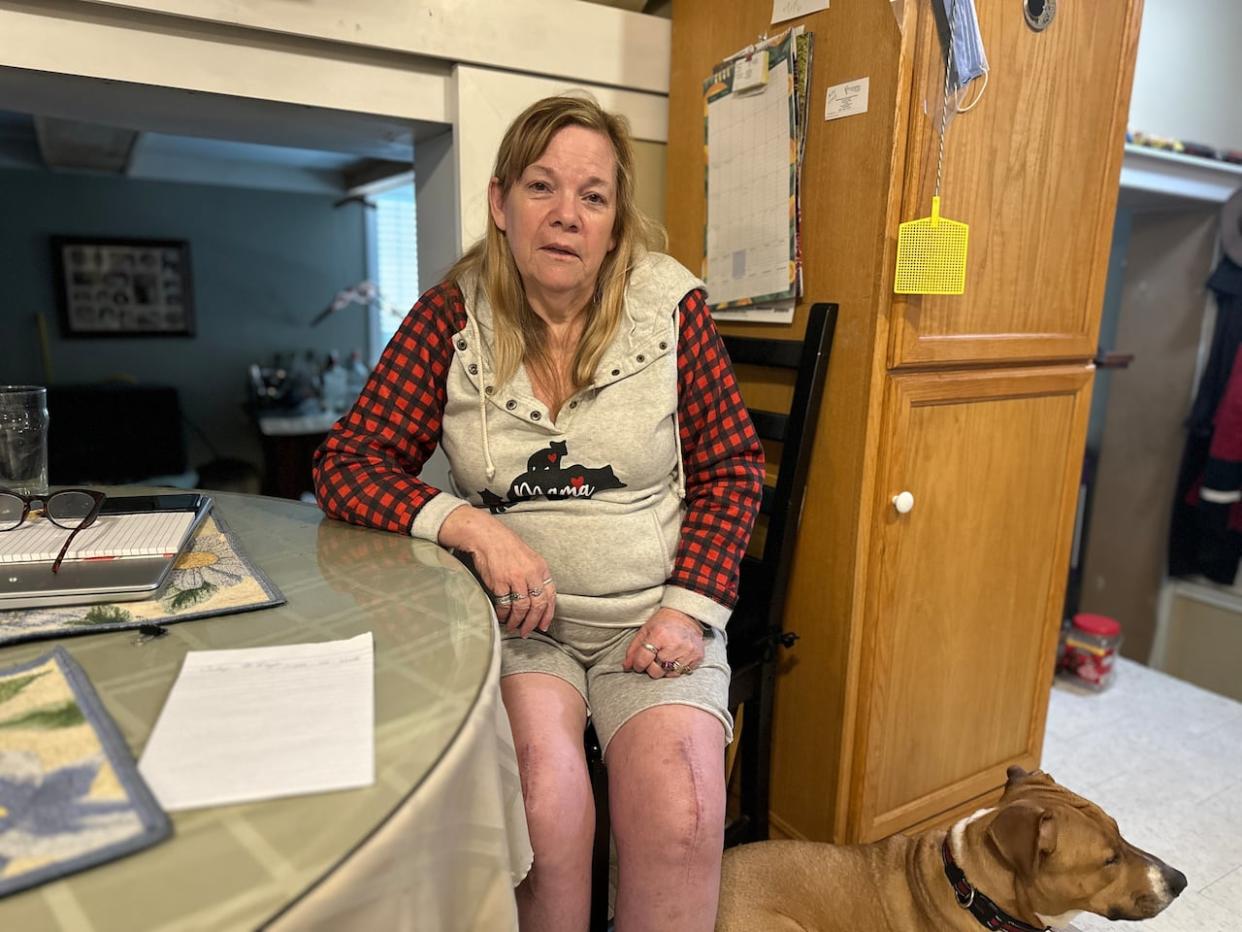London, Ont., landlord fears over $26K lost forever in long wait for tenant eviction hearing

A landlord in London, Ont., says she and her husband have lost thousands of dollars due to delays in getting a Landlord and Tenant Board (LTB) hearing to evict a tenant who was given notice to leave months ago so her daughter could move in to care for her.
"Whatever this system is with the LTB, it's broken. It's like they don't care that we're losing our income and rental income because of a medical issue," said Sue Holme.
Holme said she and her husband have lost a collective $16,000 in income, as well as $9,200 in unpaid rent she fears she'll never recover and paralegal costs.
Holme said the problems began in June 2023 when she gave the tenant an N12 to leave the main floor of her east London triplex by the end of September, and he hasn't paid rent since October. N12s are issued when a landlord or a family member will be moving into an occupied rental unit. LTB rules require at least 60 days' notice be given to a tenant given notice to move out.
Since she gave her tenant the N12, Holme, who lives in the lower floor of the triplex with her husband, has been trying to expedite an eviction hearing so the unit could be vacant before her double knee surgery. The plan was for her daughter to move into the unit and be her full-time caregiver.
'A lot of stress and grief'
Holme said she was told in December that an LTB hearing will be held this July and the tenant, who she says owes her $9,200 in rent, recently gave a move-out date of end of this month.
She believes the reason her hearing is taking this long is the LTB didn't acknowledge receiving orders from her paralegal — including documentation from Holme's surgeon — to expedite the process.
"So because they refused to acknowledge the form for my daughter to move in at all, my husband had to take three weeks off work to take care of me," said Holme, who underwent surgery last month. "I am a self-employed contract worker so I don't get paid if I don't work.
"With the tenant not paying the rent, I've also lost mine and my husband's salary simply because they're not acknowledging that I had surgery. It's caused me a lot of stress and grief."
Holme said the tenant was paying partial rent for six months before October, but he completely stopped paying when she served him the N12 to vacate by Sept. 30.
As well as giving 60 days' notice, the landlord must compensate the tenant for one month's rent, which Holme said would have come from any rent money owed to her.
CBC News has seen the documents Holme and her paralegal submitted to the LTB.
The tenant hasn't responded to requests for comment.
Ontario's response to long hearing waits
Veronica Spada, a spokesperson for Tribunals Ontario, which oversees the LTB, said in an email on Wednesday that the request to shorten time for Holme's matter was granted on Feb. 29 and the hearing will be rescheduled to an earlier date.
"The LTB does not send an acknowledgment of receipt for requests to shorten hearings, but does send the LTB adjudicator's endorsement regarding the matter to the parties once it is issued," Spada wrote.
In a recent report, Tribunal Watch Ontario noted a big backlog in LTB cases, with 53,000 of them unresolved as of March 2023, impacting at least one million Ontarians.
The LTB has implemented a number of strategies to reduce backlogs, including streamlining processes and providing adjudicators with additional training to support efficient file and hearing management, and expects to make real progress in 2024, Spada said.
"The active case count continues to be higher than ideal despite service improvements in 2022 and 2023, in part due to a 31 per cent increase in the number of applications received in 2023, to approximately 84,000 new applications," she said. "This is among the highest number of applications that the LTB has received in any given year."
The LTB resolved approximately 83,000 cases in 2023, a 45 per cent increase from 2022, she said. Spada also saidthat as of March 1, the LTB has 75 full-time and 58 part-time adjudicators, which is more than ever before.
How the surgery wait played out
Holme said even getting approved for her knee surgeries was a complicated process.
She said she had been on a one-year wait-list since April 2023 and doctors told her she could only proceed if she had a 24-hour caregiver.
The only time you have any amount of control in the whole relationship [with tenants] is prior to the start of it, and landlords have to recognize that it's similar to doing background checks for hiring employees. - Harry Fine, Toronto paralegal, former LTB adjudicator
She said she learned this Jan. 11 that her surgery would take place within two to eight weeks — information her paralegal sent to the LTB. The LTB denied that order, citing the timeframe wasn't specific enough, said Holme. She said she also sent a later notice of surgery, scheduled for Feb. 1, and that information was also immediately sent to the LTB.
"We didn't hear anything [from the LTB] and I was really panicking since I had to have a plan in place because I can't cancel my surgery and go back on a waiting list for another year."
Holme said that on Feb. 20, her paralegal sent LTB another request to speed up a hearing, emphasizing the matter's urgency as she needed care after her surgery, but she again received no response.
"Now I have to go back to work by the six-week mark because we can't afford this. I don't understand when they were given those updates, why didn't they shorten it up?" she said, referring to a hearing.
Advice for landlords
Holme feels it's unfair that two sides sign a lease, yet the landlord is held accountable and there's no enforcement for a tenant to live up to their part of the agreement.
"You buy a car and you don't pay for it, they repossess it — the same with your home and mortgage payments. But if you're a tenant and you don't pay rent, it's like, 'Oh well,' and the part that gets me is the LTB doesn't consider that a problem."
The LTB system and its entire process is akin to a train wreck, according to Toronto-based paralegal Harry Fine, a former LTB adjudicator who now offers training courses to landlords.
N12s are under extra scrutiny because of reported abuses by landlords who use them to raise rents, and that's led to it being harder to get hearings expedited, said Fine.

Harry Fine, a paralegal and past LTB adjudicator who now provides training courses for landlords, says, 'Ontario needs to create administrative procedures that can say, "You're evicted unless you do this and if you don't pay, you're evicted."' (Submitted by Harry Fine)
"There has to be a complete reworking of the way it works. The statute allows abuse, it permits abuse and Ontario needs to create administrative procedures that can say, 'You're evicted unless you do this and if you don't pay, you're evicted,'" he said.
Fine said many tenant problems can be avoided if landlords properly vet them beforehand.
"The only time you have any amount of control in the whole relationship is prior to the start of it, and landlords have to recognize that it's similar to doing background checks for hiring employees. You need to be more certain than ever that you're doing it right. There's nothing you can do once an agreement has been signed."
He urges landlords to verify letters of employment by calling employers, and run credit checks themselves even if it involves spending money. Fine said they should also ask for a potential tenant's current lease agreement and speak to current and former landlords.

